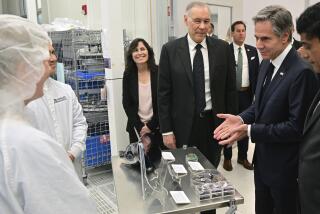Philip Morris in quest for lower-risk tobacco items
- Share via
RICHMOND, VA. -- — With waning cigarette sales due to health concerns, smoking bans and price increases, Philip Morris USA Inc. is staking its future on a new research center meant to develop products to reduce the risk of tobacco use.
The addition of the $350-million, 450,000-square-foot Center for Research and Technology nearly doubles the company’s research space and gives its scientists and engineers one facility to collaborate on new projects.
The center, which is currently occupied by about 100 employees, will be home to 500 scientists, engineers and support staff members by the end of the year.
“The investment is large . . . and we’re pretty sure that it will bear fruit for Philip Morris USA both in terms of volume and profitability in the years ahead,” Dinyar Devitre, chief financial officer for its parent company, Altria Group Inc., told analysts in a conference call last month.
Devitre said the center would give the company “a much brighter future” through improvements of current products and the development of new and reduced-risk tobacco products. He said it also would give the nation’s largest manufacturer “a leg up in the smokeless category.”
Philip Morris spokesman David Sylvia said the company’s growth would be driven by development of new products and “work that we are doing to reduce the harm related to all of our tobacco products.”
And while domestic cigarette sales continue to decline about 2% each year, Sylvia said Philip Morris was not turning away from the cigarette business, because “that’s where our expertise lies.”
The company continued to hold a 50.6% market share in the third quarter, led by its Marlboro brand. Still, the company will try to introduce new and innovative cigarettes, Sylvia said.
Philip Morris already has a reduced-risk cigarette product that will put it at the head of the pack, Citigroup analyst Bonnie Herzog said.
“There’s no doubt in my mind that Philip Morris is at the cutting edge of finding a way to reduce the risk in cigarettes,” Herzog told the Associated Press.
The product is being tested in focus groups, she said.
Herzog said the innovation was why Philip Morris broke from its competitors to endorse regulation by the Food and Drug Administration. Proposed legislation would give the FDA authority to restrict tobacco advertising, regulate warning labels and ban hazardous ingredients.
The agency also would be given the authority to set standards for reduced-risk products.
“One of our key reasons for supporting FDA regulation is our hope of reducing the harm related to tobacco,” Sylvia said. “Right now there is no testing regimen in place to determine whether one product is less risky than another.”
More to Read
Inside the business of entertainment
The Wide Shot brings you news, analysis and insights on everything from streaming wars to production — and what it all means for the future.
You may occasionally receive promotional content from the Los Angeles Times.









